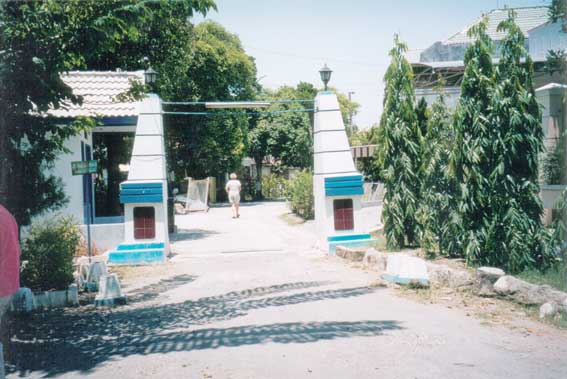We became refugees
It became far too dangerous in the prison from Banyu Biru. The internees from Ambarawa and the two other camps in Banyu Biru were already evacuated before us, since this prison had high walls all around us, we were the last to be rescued.
In October 1945 the British Ghurka's started evacuating the first women and children from our prison, and of course they were more than relieved that they could leave this prison behind them.
And then all of sudden my mother fell ill, she just couldn't stop vomiting, and two days later she had a bad diarrhoea as well, on top of everything did she also have a very high temperature. Our neighbours thought about typhoid and since this illness is very contagious, nobody came near us or helped us. Henny and I took care of my mother and that while there was no doctor left in this prison either. We gave her boiled water to drink and tried to feed her with just a little bit of boiled rice. It was frightening for my two younger sisters and me, we were very scared that we might lose our mother. We washed her and cleaned her clothes all day long and then…all of a sudden after being ill for a full week she felt a lot better again.
It was only at the end of November 1945 that the four of us could leave with the last group of women and children this horrible, dirty and smelling prison in Banyu Biru behind us. And so this last small group walked through the gate into a world of freedom, of fresh air.
We were all loaded in open trucks, but those wonderful Ghurka's had placed mattresses all around us so that we were at least just a little protected, and the Permuda's couldn't see us. We all felt very grateful and very scared at the same time since we could hear some shooting not far away from us. The line of trucks with their passengers drove slowly direction Semarang, where we would be safe. But then all of sudden our truck stopped, there was something wrong with the engine, our driver stepped out to see what was wrong. To our reassurance, all the other trucks stopped as well and luckily within ten minutes, we could drive on. At last we arrived in a camp called “ Halmaheira “ in Semarang, it looked like a paradise to all of us from Banyu Biru 10.
We received something to eat and to drink and we fell asleep until the next day. We had left our nightmare, that dirty and smelling prison, far behind us.
When I woke up the next morning I could hardly believe my eyes nor nose. The Banyu Biru prison smell had gone, there were normal toilets instead of holes in the floor. The food was good, there were enough doctors and nurses around. Our hair full with louses was treated, and so we got rid of them at last, what a wonderful feeling. Mattresses and so on were sprayed with DDT powder and what rested from our clothes was washed with soap instead of salt. Never shall I forget that piece of soap, Palmolive, that I could use when I took a bath, what a luxury that was. We also tried to get on with our lives, the women and children we shared the house with were very nice. My mother and Mrs. Sissing became friends and her daughter Wil became Henny's best friend. Poor Jansje who was still very weak fell ill, luckily there were good medicines to get her better again, but she was still very apathetic.
My mother asked the camp-head if she you could leave the camp with me and visit the nearest police office. At last after lots of talking my mother received a pass for both of us and we left the camp Halmaheira by buggy. We realized that this adventure was quite dangerous but since we had no news from my father, my mother wanted to speak with the Indonesian police, maybe they could help her. And indeed the police received us very kindly, we each received a glass of lemon-juice, delicious. The police officer phoned the police office in Lowok Waru from Malang. But alas there was no news, but the police officer promised my mother to phone her at the camp Halmaheira, he said; “We will find your husband”.
We stepped back in the buggy, the Indonesian buggy driver felt very sorry for my mother who was crying, he kept on saying; “ kasihan nonya” ( poor madam). He brought us safe back to the camp Halmaheira.
But once again there was no news about my father.

Halmaheira, picture taken by my youngest sister

